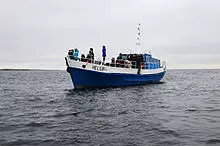ecotourism is more than just a buzzword in the tourism industry. It is a way of traveling that promotes responsible and sustainable practices, allowing travelers to explore natural areas while conserving the environment and supporting local communities. Over the years, ecotourism has gained popularity as an important endeavor, driven by the desire to preserve destinations untouched by human intervention.
The Essence of Ecotourism
At its core, ecotourism aims to educate travelers, conserve natural resources, empower local communities, and foster respect for different cultures and human rights. Travelers are encouraged to engage with the biotic components of the natural environment and gain a greater appreciation for our planet's flora, fauna, and cultural heritage.

Risks and Benefits
As with any form of tourism, ecotourism comes with both risks and benefits. On the positive side, it can provide economic opportunities for local communities, generate revenue, and create employment. It also encourages the protection and rehabilitation of natural environments, while fostering a broader sense of environmentalism and changing community attitudes towards conservation.

However, there are also potential risks associated with ecotourism. These include negative impacts on protected areas, conflicts between tourists and local communities, and health risks for both tourists and wildlife. It is crucial to manage these risks through proper regulations, visitor education, and sustainable practices.
The Economic, Ecological, and Socio-Cultural Benefits
When implemented correctly, ecotourism can have direct and indirect benefits in economic, ecological, and socio-cultural aspects. Direct benefits include promoting the protection of natural environments, providing funds for conservation, and creating economic opportunities for peripheral regions. Indirect benefits involve changes in environmental attitudes and behaviors, the preservation of cultural heritage, and fostering community stability and well-being.

Sustainable Practices and Certification
To ensure the success and sustainability of ecotourism, there is a need for proper regulation, accreditation, and education. Various organizations and programs, such as the Global Sustainable Tourism Council, have developed criteria and performance indicators to differentiate true ecotourism experiences from unsustainable ones. These initiatives promote responsible travel, conservation efforts, and the involvement of local communities.
Challenges and Criticisms
Despite its positive intentions, ecotourism faces challenges and criticisms. The definition of ecotourism is often debated, leading to misconceptions and greenwashing. There are concerns about the negative environmental impacts, displacement of Indigenous peoples, mismanagement by governments, and the commodification of nature. It is crucial to address these issues through better regulations, education, and sustainable practices.

Moving Towards a Sustainable Future
As ecotourism continues to grow, it is essential to strive for a balance between economic growth, environmental conservation, and social well-being. By promoting responsible and sustainable practices, supporting local communities, and preserving natural resources, we can create a future where ecotourism truly fulfills its promise of a greener and more responsible travel experience.

















